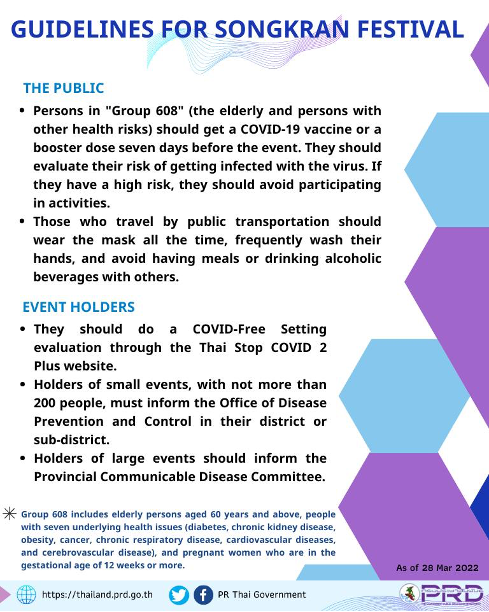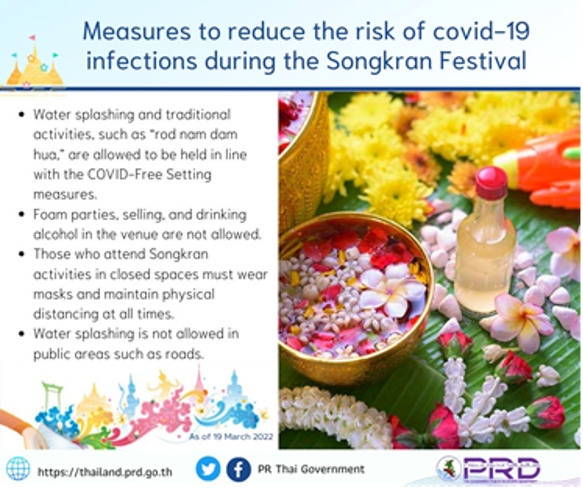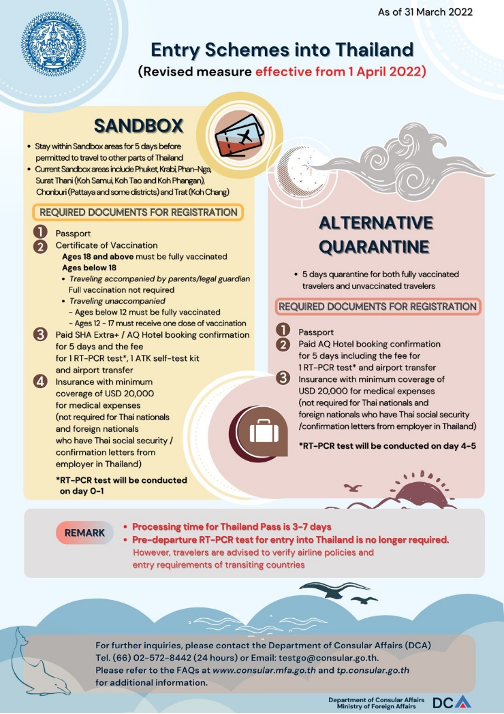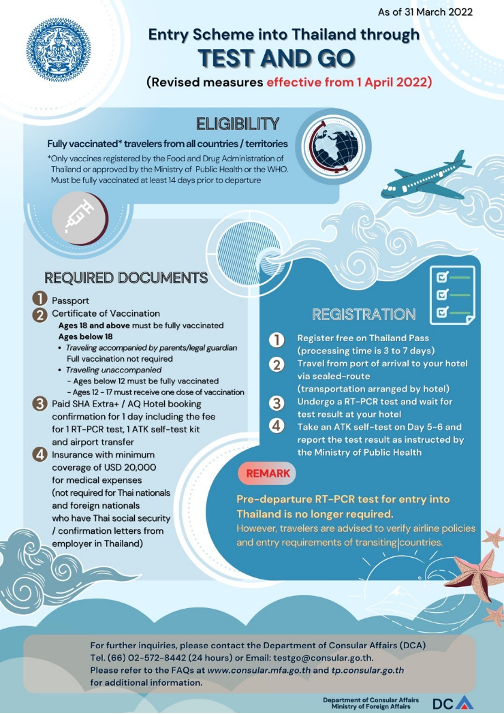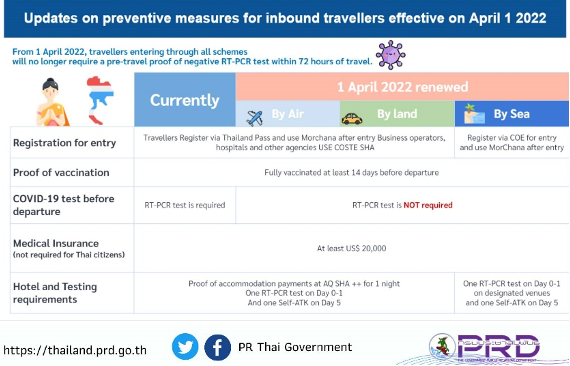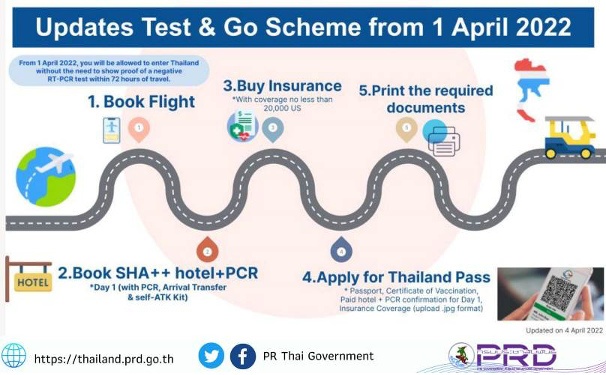TCEB Situation Update COVID-19 Virus on 4 April 2022
In order to continuously operate social and economic activities while reinforcing public health measures with the upcoming Songkran Festival, during which many people will travel, Thai government has issued appropriate measures of disease control and prevention in response to the current situation, focusing on the responsibility towards the family and the society, the economy recovery, and the efficient public health management. The details of measures and guidelines are as follows:
1. Adjustment of the provincial zones to fit the situation
The Centre for COVID-19 Situation Administration (CCSA) has ordered the adjustment of provincial zones and increased the pilot tourism areas which will be effective from 1 April 2022 onwards. The details are as follows:
1) Controlled areas – a total of 20 provinces: Tak, Nakhon Nayok, Nakhon Pathom, Nakhon Ratchasima (except Muang District, Chaloem Phra Kiat District, Chok Chai District, Pak Chong District, Phimai District, Wang Nam Khiao District, and Sikhio District), Nakhon Si Thammarat, Buriram (except Muang District), Prachuap Khiri Khan (except Hua Hin Municipality, only Tambon Hua Hin and Tambon Nong Kae), Phra Nakhon Si Ayutthaya (except Phra Nakhon Si Ayutthaya District), Phatthalung, Phichit, Phitsanulok, Ranong (except Koh Phayam), Rayong (except Koh Samet), Ratchaburi, Songkhla, Samut Prakan (except the Suvarnabhumi Airport), Samut Sakhon, Surat Thani (except Koh Tao, Koh Pha-Ngan and Koh Samui), Udon Thani (except Muang District, Kumphawapi District, Na Yung District, Ban Dung District, Prachaksinlapakhom District and Nong Han District), Uttaradit
2) High surveillance areas – a total of 47 provinces: Kalasin, Kamphaeng Phet, Khon Kaen (except Muang District, Khao Suan Kwang District, Poei Noi District, Phon District, Phu Wiang District, Wiang Kao District, and Ubolratana District), Chanthaburi (except Muang District and Tha Mai District), Chachoengsao, Chainat, Chaiyaphum, Chumphon, Chiang Rai (except Muang District, Chiang Khong District, Chiang Saen District, Thoeng District, Phan District, Mae Chan District, Mae Fah Luang District, Mae Sai District, Mae Suai District, Wiang Kaen District, and Wiang Pa Pao District), Trang, Trat (except Koh Kood District and Koh Chang District), Nakhon Phanom, Nakhon Sawan, Narathiwat, Nan, Bueng Kan, Prachinburi, Pattani, Phetchabun, Phrae, Phayao, Maha Sarakham, Mukdahan, Mae Hong Son, Yala, Yasothon, Roi Et, Lopburi, Lampang, Lamphun, Loei (except Chiang Khan District), Sisaket, Sakon Nakhon, Satun, Samut Songkhram, Sa Kaeo, Saraburi, Sing Buri, Sukhothai, Suphan Buri, Surin (except Muang District and Tha Tum District), Nong Khai (except Muang District, Tha Bo District, Sri Chiang Mai District and Sangkom District), Nong Bua Lamphu, Ang Thong, Uthai Thani, Ubon Ratchathani, Amnat Charoen
3) Pilot tourism areas – a total of 26 provinces: Bangkok, Krabi, Kanchanaburi, Khon Kaen (only Muang District, Khao Suan Kwang District, Poei Noi District, Phon District, Phu Wiang District, Wiang Kao District and Ubolratana District), Chanthaburi (only Muang District and Tha Mai District), Chonburi, Chiang Rai (only Muang District, Chiang Khong District, Chiang Saen District, Thoeng District, Phan District, Mae Chan District, Mae Fah Luang District, Mae Sai District, Mae Suai District, Wiang Kaen District and Wiang Pa Pao District), Chiang Mai, Trat (only Koh Kood District and Koh Chang District), Nakhon Ratchasima (only Muang District, Chaloem Phra Kiat District, Chok Chai District, Pak Chong District, Phimai District, Wang Nam Khiao District, and Sikhio District), Nonthaburi, Buriram (only Muang District), Pathum Thani, Prachuap Khiri Khan (only Hua Hin Municipality, only Tambon Hua Hin and Tambon Nong Kae), Phra Nakhon Si Ayutthaya (only Phra Nakhon Si Ayutthaya District), Phang Nga, Phetchaburi, Phuket, Ranong (only Koh Phayam), Rayong (only Koh Samet), Loei (only Chiang Khan District), Samut Prakan (only the Suvarnabhumi Airport), Surat Thani (only Koh Tao, Koh Pha-Ngan and Koh Samui), Surin (only Muang District and Tha Tum District), Nong Khai (only Muang District, Tha Bo District, Sri Chiang Mai District and Sangkhom District), Udon Thani (only Muang District, Kumphawapi District, Na Yung District, Ban Dung District, Prachaksinlapakhom District and Nong Han District)
2. Extension of duration in the enforcement of disease control and preventive measures
The integrated control measures, prohibitions, exclusions and execution guidelines for different levels of provincial zones, including preparation measures as stated in Regulation No. 37 dated 30 October 2021 and the integrated control measures in pilot tourism areas as stated in Regulation No. 42 dated 8 January 2022, namely the prohibition of activities with a risk of disease transmission, gathering activities that can be held without permission, the integrated control measures in provincial zones as fitting to the situation, nation-wide preparation of establishments or venues with risk of disease spreading, together with measures, rules or guidelines established by the competent officials under such regulation, will remain in force.
Organisation of events or activities in Bangkok
Bangkok Metropolitan Administration (BMA) has eased the measures relating to the organisation of activities which will be effective from 15 March 2022 onwards.
- The organisation of meetings, seminars, events in hotels, exhibition centres, convention centres, department stores, community malls, conference facilities, banquet facilities, or any other similar facilities must comply with the COVID Free Setting measures and the guidelines of the Ministry of Public Health and Thailand Convention and Exhibition Bureau (Public Organization). The alcoholic beverage can be served during the regular opening time until 23.00 hrs. only. The food and drink outlets must be SHA PLUS certified according to the Amazing Thailand Safety and Health Administration or they must meet the criteria of cleanliness and safety of the COVID-19 prevention as stated in Thai Stop COVID 2 Plus.
- The number of participants in the activities must comply with the clause 6 of BMA Announcement on Order of Temporary Closure of Premises No. 45 dated 30 October 2021 which is stipulating that the activities gathering more than 1,000 participants are not allowed to be organised except with the permission from the BMA Health Department or following the exceptions as in the Regulations No. 37 dated 30 October 2021.
3. Adjustment of specific integrated control measures for Songkran Festival from 1 April 2022
People who travel for tourism or family purpose should receive full vaccination, evaluate the risk, observe symptoms, or undergo the COVID-19 using ATK self-test kit in the duration of 72 hours before travelling, meeting and gathering. People in risky and vulnerable groups should receive the booster dose. Provincial Communicable Disease Committees consider and specify premises, businesses, and activities that can be operated case by case for Songkran Festival with the following criteria.
1) For the areas that are specified or allowed to organise Songkran activities, entrepreneurs, organisers or people in charge must operate and comply with the measures of disease prevention and reduction of contamination risk in cluster, including COVID Free Setting measures as follows:
a. Traditional activities involving water such as sprinkling scented water on statues of Buddha, pouring water on hands of the elders, traditional games, cultural performances, local traditions, parades, or music performances are allowed to be organised.
b. Activities involving powder and foam parties are prohibited.
c. Alcohol consumption and sales are prohibited in activity premises.
d. Screening and registration at entrance and exit points must be provided.
e. The number of participants must be controlled with no less than 4 square meters per one person.
2) Activities involving water, powder, foam parties, or any other activities with risk of contamination are prohibited in public areas and the areas without permission to organise the activities.
3) Songkran Festival in villages or communities can be organised with the permission from Disease Control Center or Local Administrative Organization of each community and must comply with disease control and preventive measures.
4) For the premises or the activities with risk of contamination, entrepreneurs or people in charge must follow safety measures corresponding to specific governmental regulations.
In order to monitor the disease spreading, the government requires the cooperation of those who return to work after Songkran Festival to evaluate the risk and observe the symptoms for one week. Government agencies, entrepreneurs, or business owners can consider the work from home scheme.
Organisation of Songkran activities in Bangkok
1) For Songkran activities gathering less than 1,000 participants, entrepreneurs, organisers, or people in charge must obtain the permission from the district offices. For activities gathering more than 1,000 participants, entrepreneurs, organisers, or people in charge must obtain the permission from the BMA Health Department five days before the activity. The activities should be organised in open space with good ventilation areas and avoid holding activities in narrow and air-conditioned rooms.
2) In case of the areas that the Songkran Festival activities are allowed to organise in, entrepreneurs, organisers, or people in charge must comply with preventive measures to reduce risk of disease contamination in cluster, including the COVID Free Setting measures and specific integrated control measures for Songkran Festival, stipulated in regulations No. 43 dated 30 March 2022.
(http://www.ratchakitcha.soc.go.th/DATA/PDF/2565/E/075/T_0044.PDF - TH Version)
4. Adjustment for inbound travellers
The Centre for COVID-19 Situation Administration (CCSA) has adjusted the guidelines for entering into Thailand to fit the current situation which is effective from 1 April 2022 onwards. The details are as follow:
1) Travellers who have already received the vaccines as required by the Ministry of Public Health are allowed to enter into Thailand by air and by land with the registration of Thailand pass, and by sea with the COE.
2) The proof of a negative COVID-19 using RT-PCR test 72 hours before travelling is cancelled for all six traveller types: type (1) travellers, those who are permitted to enter the country for economic benefits along with the security of public health according to the plan of opening the country of the government, type (2) travellers, those who are permitted to enter the country in an area designated as a pilot tourism area for the benefits of economy, tourism, or other activities in accordance with the government policies, type (3) travellers, those with exemptions that the Prime Minister or the chief responsible for resolving the emergency decide, permit or invite to enter the country as necessary or a person in a foreign government agency or international agencies working in the Kingdom as well as spouses, parents or children of such persons as permitted by the Ministry of Foreign Affairs as necessary, (4) travellers, which are freight forwarders as necessary that when the mission is completed, they have to leave the country without delay, type (5) travellers, which are vehicle operators or vehicle personnel who are required to enter on a mission and have a clear time to leave the country, and type (6) travellers, those who enter the country under disease control and preventive measures in quarantine facilities prescribed by the government.
3) Type (1) travellers must have the proof of the payment for accommodations or government-designated quarantine facilities for the first day in the country, the proof of the payment for one COVID-19 using RT-PCR test and the payment of one COVID-19 using ATK self-test kit. Travellers must travel to hotels, accommodations, government-designated quarantine facilities to undergo the COVID-19 using RT-PCR test without a stopover in a provided vehicle via a sealed-route within five hours. If the first COVID-19 using RT-PCR test result is negative, travellers are allowed to continue travelling and must strictly follow public health measures. Travellers must undergo the COVID-19 using ATK self-test kit on day 5 of their stay or when respiratory symptoms are present. Travellers must have the government-designated application and keep it turn on at all times to monitor the symptoms and record the test result of COVID-19 using self-test kit during their stay in Thailand.
4) Type (2) travellers must have the proof of the payment for accommodations or government-designated quarantine facilities for at least 5 days, the proof of the payment for one COVID-19 using RT-PCR test, and the payment of one COVID-19 using ATK self-test kit. Travellers must travel to hotels, accommodations, government-designated quarantine facilities in pilot tourism areas to undergo the COVID-19 RT-PCR test without a stopover in a provided vehicle via a sealed-route within five hours. If the first COVID-19 using RT-PCR test result is negative, travellers are allowed to travel in pilot tourism areas and must strictly follow public health measures. Travellers must undergo the COVID-19 using ATK self-test kit on day 5 of their stay or when respiratory symptoms are present. After 5 days of their stay in pilot tourism areas and with a negative result of COVID-19 using ATK self-test kit, travellers can travel outside pilot tourism areas. Travellers must have the government-designated application and keep it turn on at all times to monitor the symptoms and record the test result of COVID-19 using self-test kit during their stay in Thailand.
The details of the regulations No. 24 and disease preventive measures for travelling into the country of the CCSA Order No. 7/2565 dated 30 March 2022, http://www.ratchakitcha.soc.go.th/DATA/PDF/2565/E/075/T_0049.PDF (Thai Version)
Department of Consular Affairs – Thailand Pass FAQs
https://consular.mfa.go.th/th/content/thailand-pass-faqs-2?cate=5ddbe42115e39c4768007e1d
References
http://www.ratchakitcha.soc.go.th/DATA/PDF/2565/E/075/T_0044.PDF (TH Version)
http://www.ratchakitcha.soc.go.th/DATA/PDF/2565/E/075/T_0048.PDF (TH Version)
http://www.ratchakitcha.soc.go.th/DATA/PDF/2565/E/075/T_0049.PDF (TH Version)
https://www.prbangkok.com/th/covid/detail/19/11163 (TH Version)
https://www.prbangkok.com/en/covid/detail/19/11745
https://www.prbangkok.com/en/covid/detail/19/6041
https://www.facebook.com/photo/?fbid=335221228640694&set=a.304938938335590
https://www.facebook.com/thailandprd/posts/339137384915745
https://www.facebook.com/thailandprd/posts/337317938431023
https://www.facebook.com/ThaiConsular/posts/322529129973944
https://www.facebook.com/thailandprd/posts/341014371394713
###
Further information about COVID-19 outbreak situation from WHO:
https://www.who.int/thailand/emergencies/novel-coronavirus-2019/situation-reports
Department of Disease Control Contact Centre (Call 1422 24/7)
https://ddc.moph.go.th/viralpneumonia/index.php
Thailand Convention and Exhibition Bureau (TCEB) (Call +66 (0) 2694 6000)
https://www.businesseventsthailand.com/en/situation-update-coronavirus-covid-19 or info@tceb.or.th
